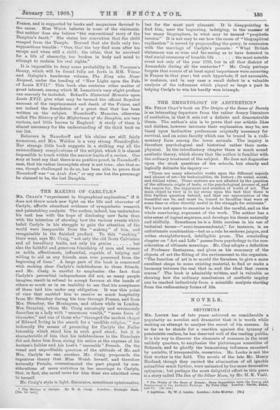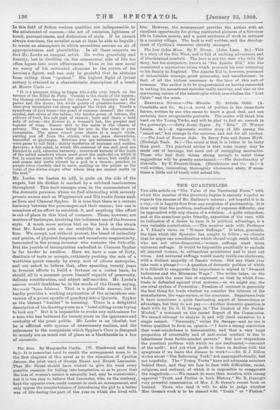NOVELS.
SEPTIMUS.t
• The Origin of the Sense of Beauty: Some Suggestions on the Source 44 Development of the Aesthetic Feelings. By Felix Clay. London: Smith, Elder, and Co. [Oa. net.] t Septimus. By W. J. Locke, Losilen John Kerrey. [kJ MR. LOCKE has of late years achieved so considerable a popularity as novelist and dramatist that it is worth while making an attempt to analyse the secret of his success.. In so far as he stands for a reaction against the tyranny of ; pessimistio realism, he has deserved well of the reading public. It is his way to discover the elements of romance in the most unlikely quarters, to emphasise the picturesque amenities of Bohemia, and to glorify the humanising influence exercised by amiable, if irresponsible, eccentrics. Mr. Locke is not the first worker in the field. The novels of the late Mr. Henry Harland, though they carried the elimination of all ignoble actualities much further, were animated by the same decorative optimism ; but perhaps the most delightful effort in this genre is a story called The Inn of the Silver Moon, by Mr. H. K. Viol&
'In this field of fiction various qualities are indispensable to the attainment of success,—the art of omission, lightness of touch, persuasiveness, and distinction of style. If he cannot always convince, the novelist must at least be able to beguile ; to create an atmosphere in which unrealities assume an air of appropriateness and plausibility. In all these respects we find Mr. Locke an unequal artist. He writes gracefully and fluently, but in dwelling on the ornamental side of life too often lapses into mere effusiveness. Thus in his new novel we weary of his reiterated allusions to the curves of his heroine's figure, and can only be grateful that he abstains from calling them "opulent." His highest flight of lyrical ecstasy is attained in a characteristic description of a lunch at Monte Carlo
" It is a pleasant thing to linger tete-e-tlte over lunch on the terrace of the Hotel de Paris. Outside is the shade of the square ; the blazing sunshine beyond the shadow ; the fountain and the palms and the doves; the white gaiety of pleaenrelhouses ; the blue-grey mountains out sharp against the violet sky. Inside a symphony of cool tones—the pearl of summer dresses; the snow, crystal, and silver of the tables ; the tender green of lettuce, the yellows of fruit, the soft pink of salmon ; here and there a bold note of colour—the flowers in a woman's hat, the purples and topazes of wine. Nearer still to the sense is the charm of privacy. The one human being for you in the room is your companion. The space round your chairs is a magic circle, cutting you off from the others, who are mere decorations, beautiful or grotesque. Between you are substances which it were gross to call food : dainty mysteries of coolness and sudden flavours ; a fish salad, in which the essences of sea and land • are blended in cold, celestial harmony ; innermost kernels of the lamb of the salted meadows whore must grow the asphodel on which it fed, in amorous union with what men call a sauce, but really oil and cream and herbs stirred by a god in a dream ; peaches in 'purple ichor chastely clad in snow, melting on the palate as the voice of the divine singer after whom they are named melts on the soul."
Mr. Locke, we hasten to add, is quite on the side of the angels, but his diction is marked by a subdued lusciousness throughout. This trait emerges even in the nomenclature of the dramatis personae, where we find alternating with severely prosaic names such as Wiggleswick and Dix exotic forms such as Zora and Clement Sypher. It is true that there is a certain harmony between the personages and their names; but one is
conscious of an effort to establish it, and anything like effort is out of place in this kind of romance. These, however, are matters of technique, involving the indiscreet use of the bravura style. A much more serious blot on the book is the strain that Mr. Locke puts on our credulity in his characterisa- tion. We accept, not without protest, the blend of imbecility and genius, of physical limpness and monstrous magnanimity, incarnated in the young inventor who sustains the title-role. But the jumble of incongruities embodied in Clement Sypher is' far harder to swallow. Here we have a man of forty, destitute of taste or scruple, ruthlessly pushing the sale of a worthless quack remedy by every sort of odious enterprise, and are asked to believe that, after spending twenty years in feverish efforts to build a fortune on a rotten basis, he should all in a moment prove himself capable of generosity, delicate consideration, and abject self-sacrifice. Mr. Locke's answer would doubtless be in the words of the Greek saying, 1111mrtriv "Epos SIBeicricre. That is a plausible answer, but it hardly provides a working explanation of the miraculous con- version of a prime apostle of quackery into a Quixote. Sypher as the blatant " bustler " is amusing. There is a delightful description of his drawing-room as a " hotel sitting-room trying to look coy." But it is impossible to evoke any enthusiasm for a Man who has battened for twenty years on the ignorance and credulity of the gross public. Mr. Locke is an idealist, but be is afflicted with spasms of unnecessary realism, and the
references to the complaints which Sypher's Cure is designed to remedy are as much out of place as a blackbeetle in a box of caramels.







































 Previous page
Previous page